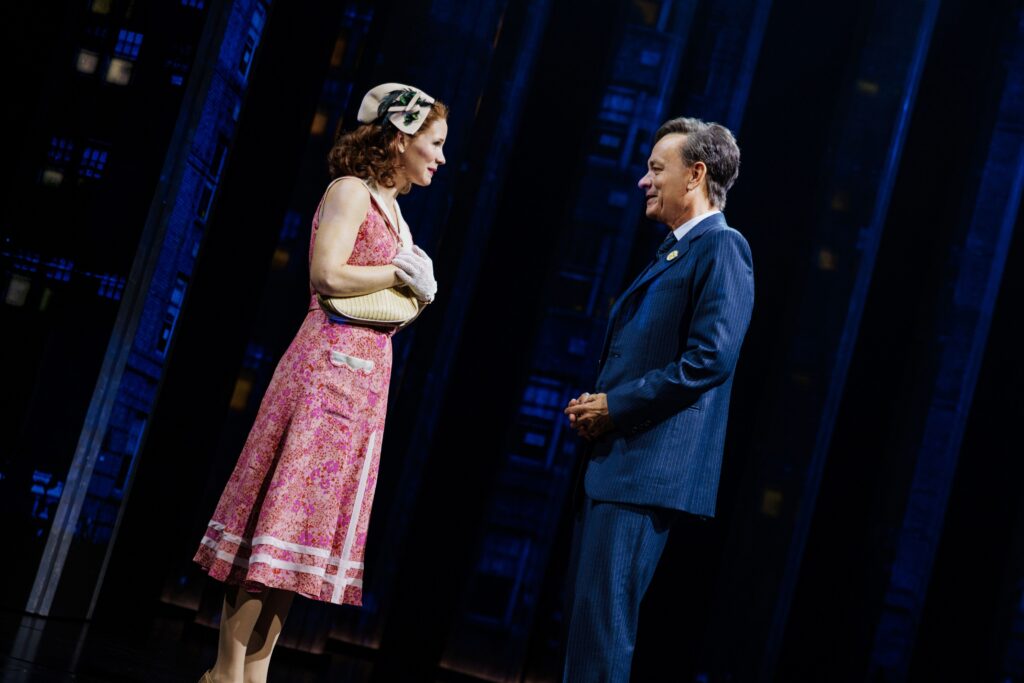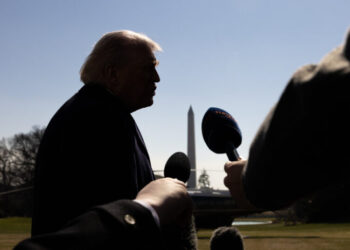NEW YORK — If you could time travel after seeing “This World of Tomorrow,” you would probably rewind to the moment before you bought a ticket.
“But I love Tom Hanks!” Let me stop you right there. If you would like to preserve your affection for Hollywood’s most beloved leading man — one who arguably helped ensure we would even have a world of tomorrow by putting a famous face to the pandemic — save yourself now.
In a hundred years, scientists could study how his new play, a befuddling sci-fi rom-com playing off-Broadway at the Shed, became one of the more inane star vehicles of our time. To save them the trouble, because they’ll no doubt be busy rescuing humanity from far worse, here’s a breakdown of the evidence.
First, let’s keep Hanks’s co-star Kelli O’Hara above this fray where she belongs. As a wounded but warm and plucky divorcée, she is the lone lighthouse in this sea of slop. It’s easy to see why a few minutes with her character, as she kicks off her uncomfortable heels at the 1939 World’s Fair, would make a time-traveling man crazy to see her again. In fact, O’Hara’s delicate radiance in the role — and the devotion it inspires — is the only part of the story that makes sense.
Why does the boss (played by Hanks) at a futuristic company making futuristic things sometime in the future choose to travel back to the 1939 World’s Fair? Well, it was … a $225 million birthday gift from a colleague (Kerry Bishé), who has a skeevy-sounding agreement called an “Intimate Relations Contract” with her boss. (The skeevy-ness goes unexplained.)
And how does this man travel to the past? A company called Chronometric Adventures transports uber-rich clients to select periods in history for fixed windows of time determined by echoes in the space-time continuum. Or something. Naturally, the portal is a Manhattan hotel room. (Here you might be hoping for a rebuke of the billionaire class and their extreme pursuit of pleasure and adventure. You poor thing.)
The beep-boop-bop of how it’s supposed to work is somewhere in the stilted dialogue, which could be satirizing science fiction if it weren’t so earnestly trying to sound like legitimate science fiction. Fans of that genre know how rich the themes of time travel can be, with any array of insights and provocations about the past, present and future. Here, it’s merely a device that grows tiresome the more you realize it has none of those things.
The script is co-written by Hanks and James Glossman, a theater maker and lecturer at Johns Hopkins University, who collaborated on a previous iteration titled “Safe Home,” which had its world premiere in Upstate New York in 2022. It stitches together three short stories, Frankenstein-style, from the actor’s 2017 collection “Uncommon Type.” That may help explain its many oddities and loose ends, unified (such as they are) by an overall vibe of nostalgia, New York-iness and the sheen of an expensive production without a clear creative hook beyond the presence of its star.
Directed by Kenny Leon, who also led the baffling star-powered revival of “Othello” this past spring, the production paradoxically lends the play’s stale hokeyness a high-tech polish. (The set’s flurry of screens and the constant projections are by Derek McLane.) Digitally visualizing each location doesn’t lend the play, whose slight moral seems to be that love changes people, any deeper coherence.
At least we know why Hanks’s smitten CEO keeps returning to the past. He invents an excuse for his office the first time around — about learning from the World’s Fair’s futuristic vision of the future, or something — when really, he’s sweet on the woman he keeps meeting there. He returns again and again, a la “Groundhog Day,” wooing her until they eventually enjoy the perfect romantic afternoon, even while accompanied by her precocious niece (Kayli Carter), who’s meant to be a teenager but reads like an adult who acts like one.
And how does Hanks fare, returning to the New York stage after his Broadway debut in Nora Ephron’s “Lucky Guy” in 2013? He’s Tom Hanks! The singular, innate charm he has demonstrated on-screen over four decades, six Oscar nominations and two wins is in evidence here: The half-smile that makes his eyes squint and twinkle. The everyman nobility that echoes through his voice. Maybe you would follow him anywhere, including here. But you’ve certainly seen him do far more with better material.
“This World of Tomorrow” manages to create the uncanny feeling of being stuck in both the future and the past, which is actually an impressive feat. Either way, you can’t help but long to escape.
This World of Tomorrow, through Dec. 21 at the Shed in New York. 2 hours and 15 minutes with an intermission. theshed.org.
The post The Tom Hanks play is bad
appeared first on Washington Post.




